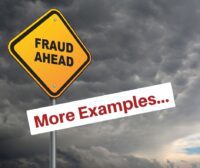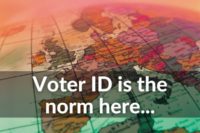Requiring voters to prove they are who they say they are in order to cast a ballot is a simple, common-sense measure that helps ensure honest elections.
Opponents of photo ID falsely charge that such requirements discriminate against poor and minority voters. Each time this claim has been used in the courts, plaintiffs have failed to produce evidence of any individual who was actually denied the right to vote for lack of a photo ID. Despite this fact, and that all demographic groups including African-Americans support voter ID laws, accusations of Jim Crow, the racist system that disenfranchised Southern blacks for generations, continue to be hurled with abandon.
The Supreme Court has stated that because voter ID is free, the inconveniences of going to the Bureau of Motor Vehicles, gathering applicable documents, or posing for a photograph are not substantial burdens on most voters’ right to vote. Nor do they represent a significant increase over the usual burdens of voting — registering or driving to a polling place. If people show up without an ID, they can cast a provisional ballot and bring in their ID later.
The Supreme Court found that the interests in requiring voter ID are unquestionably relevant in protecting the integrity and reliability of the electoral process as part of a nationwide effort to improve and modernize election procedures criticized as antiquated and inefficient.
In Crawford v. Marion County Election Board (2008), the Supreme Court also noted the particular interest in preventing voter fraud in response to the problem of voter registration rolls with a large number of names of persons who are either deceased or no longer live in Indiana. While the trial record contained no evidence that “in-person voter impersonation at polling places had actually occurred in Indiana, such fraud had occurred in other parts of the country, and Indiana’s own experience with voter fraud in a 2003 mayoral primary demonstrates a real risk that voter fraud could affect a close election’s outcome.”
The Supreme Court noted that there was no question that the state had a legitimate and important interest in counting only eligible voters’ ballots. Lastly the Court noted that the state interest in protecting public confidence in elections also has independent importance because such voter confidence encourages citizen participation in the democratic process.
Using a photo ID for voting is a central recommendation from the bipartisan Commission on Federal Election Reform, headed by former President Jimmy Carter and former Secretary of State James Baker. Here’s what the commission’s official report says:
“A good registration list will ensure that citizens are only registered in one place, but election officials still need to make sure that the person arriving at a polling site is the same one that is named on the registration list. In the old days and in small towns where everyone knows each other, voters did not need to identify themselves. But in the United States, where 40 million people move each year, and in urban areas where some people do not even know the people living in their own apartment building let alone their precinct, some form of identification is needed.”
“The electoral system cannot inspire public confidence if no safeguards exist to deter or detect fraud or to confirm the identity of voters. Photo IDs currently are needed to board a plane, enter federal buildings, and cash a check. Voting is equally important.”
ACTIVITY
JASON SNEAD: America’s Electoral System Is Suffering From A Credibility Crisis
Defying all predictions of a photo finish senate race, Pennsylvania Democrat John Fetterman won 50.3% of the vote to Republican Dr. Mehmet Oz’s 47.3%. The unexpectedly large margin helped avoid a midterm meltdown. But don’t be deceived; that margin masks major electoral system dysfunction that remains unaddressed.
SNEAD: A Disturbing Movement Is Picking Up Steam On The Left — Letting Noncitizens Vote
Voting has long been one of the privileges of American citizenship, but perhaps not for much longer. Left-wing activists are going all-in with their demands to let noncitizens vote, and Washington, D.C., just took up the charge.
Democrat blows whistle on alleged ballot harvesting scheme, Florida opens criminal probe
Florida Gov. Ron DeSantis' new election crimes unit has recommended state police open a full criminal investigation into a Democrat whistleblower's detailed complaint of a long-running, widespread ballot harvesting operation in the African-American communities in politically important central Florida.
Von Spakovsky: Lawsuit Continues Against Benson Over Dead on Voter Rolls
Culling dead individuals from Michigan voter rolls is a pretty basic task for Secretary of State Jocelyn Benson. Now Judge Jane M. Beckering, an appointee of President Joe Biden, has rejected Benson’s demand to dismiss a lawsuit filed against her claiming she refused to remove almost 26,000 dead individuals from the state’s voter rolls.
Von Spakovsky: Voter Fraud Cases Continue to Occur
We recently added nine new cases to the Heritage Election Fraud Database, bringing the total number of entries of proven instances of voter fraud in the database to 1,374. The mounting collection of cases continue to disprove the narrative that voter fraud is not real and that further election integrity measures are not needed.
Arizona Supreme Court Election Integrity Wins over Soros Ballot Measure
Supporters for election integrity scored a major victory Friday when the Arizona Supreme Court held that Proposition 210 — a ballot initiative to undo Arizona’s new election integrity law, financed with George Soros’s money — cannot be on the November ballot due to a lack of valid signatures.
Ed Meese and Ken Blackwell: The Most Despicable Form of Vote Fraud
We celebrate patriotic senior citizens and the invaluable contributions they have made to the financial strength and fundamental freedoms we enjoy as Americans. In turn, we must take every action to ensure the integrity and intent of our seniors’ political choices at a time when they are at risk to be targets of vote fraud. We are calling on fellow Americans to demonstrate their gratitude and respect for seniors by helping to protect the sanctity of their votes.
Hans von Spakovsky: Ensuring That Only US Citizens Vote
The latest politically motivated lawsuit—filed against Arizona by the Biden Justice Department over the state’s new law attempting to verify the citizenship of registered voters—demonstrates the importance of a bill just introduced by Rep. Gary Palmer, R-Ala., HR 8223, that would stop that lawsuit in its tracks.
Wisconsin Supreme Court disallows absentee ballot drop boxes
Wisconsin’s conservative-controlled Supreme Court ruled Friday that absentee ballot drop boxes may be placed only in election offices, dealing critical defeats to Democrats in the battleground state.
Hans von Spakovsky: This Supreme Court Ruling Will Prove Vital to Defending Voter ID
The Supreme Court’s important ruling last week on voter ID in North Carolina has been overlooked in the fervor over the high court’s spot-on decisions upholding the Second Amendment and religious freedom and overruling Roe v. Wade. But the court’s procedural decision Thursday in Berger v. NAACP will help prevent state officials from sabotaging the defense of state election laws and other measures being attacked by their political allies and friends.







